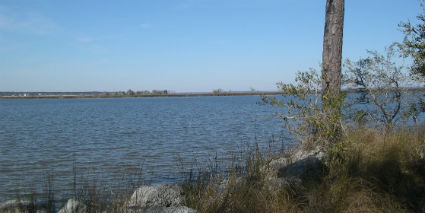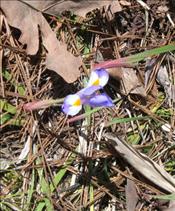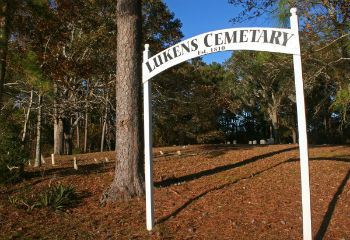SOUTH RIVER — The group traipsed along a trail through the wet woods on the Lukens Island peninsula of Down East Carteret County on a cold spring morning. Three stop suddenly, as one spots a tiny, delicate flower blooming in a beam of sunlight.
“It’s a blue fringe iris,” the fellow from Marine Corps said happily, as he bent over to get a better look.
Supporter Spotlight
Two others in the group – a semi-retired developer from Morehead City and an attorney from New Bern – also bent down to admire nature’s hardy handiwork. All got increasingly excited as they saw more of the flowers farther along the trail that runs from the Lukens Lodge toward the headwaters of Brown’s Creek.
They also talked, almost reverently, of the deer and bear and wild turkey and great blue herons that wander through or fly over the land. They noted that there has been at least one bald eagle nest on the property, and said, with a hint of pride, that state wildlife officials had told them turkey wouldn’t live there. There are now about 150.
Mack Baker, the guy from Morehead, and John Ward, the attorney from New Bern, and their 12 partners, recently signed over the development rights to their 678-acre tract in a deal with the N.C. Coastal Land Trust, the Marine Corps, the Navy and North Carolina.Lukens Lodge, of which the fellow from Morehead and the guy from New Bern are part owners, is a truly isolated haven for hunters. But thanks to a decision by the two men and their partners, it also will be, in perpetuity, conserved in its natural state.
Carmen Lombardo, the first to spot the iris, was the point man for the project as the natural resources manager at the Corps’ air station in nearby Cherry Point. Janice Allen, the deputy director of the land trust, rounded out the group.
All are pleased because everybody wins. The land trust gets to preserve habitat and help protect water quality in the area, and the military ensures that no tall structures will ever impede flights and no residences will be built near the adjacent Piney Island Bombing Range, a key East Coast training ground. The landowners will get to keep hunting and fishing. And, of course, the irises get to keep blooming and the creatures, including alligators, which on this day went unseen like the bears and the turkeys (save a feather or two), get to keep wandering.
Supporter Spotlight
“We’re very proud to have completed another acquisition of development rights at Lukens Island,” Allen said. “We have completed 15 such “dual” military/conservation projects since 2006, protecting more than 7,500 acres of valuable wildlife habitat and preserving water quality while helping our local military bases.”
The property features pine and hardwood forests, sloping down to marshes along the banks of Brown’s Creek, a relatively pristine tidal stream. Lukens, actually a peninsula but so isolated it feels like an island, stretched from South River on the west to Turnagain Bay on the east. The Navy’s Piney Island Bombing Range is just across the bay. The protected land is also adjacent to the N.C. Wildlife Resources Commission’s 1,300-acre game lands that is open to the public, and it’s not far to the west of the Cedar Island National Wildlife Refuge.
As a result, Allen said, “the project contributes to a growing network of protected riparian areas along the Neuse River and multiple tributaries within the lower Neuse River Estuary.”
Money for the protection of this property came from a grant from the N.C. Clean Water Management Trust Fund and the U.S. Department of Defense’s Readiness and Environmental Protection Initiative.
“It’s good for everyone involved,” Ward said. “We’re very happy to have been able to do this.”
 The western tip of Lukens Island looks out to South River in northern Carteret County. Photo: Brad Rich |
“It lets us keep this land as it is now,” Baker added. “We won’t have to sell any of it.”
Although development has slowed dramatically in Carteret County during the Great Recession and its lingering aftermath, there have long been developers interested in the Lukens area, which, though uninhabited now, once was home to a thriving village and isn’t far, by water from the village of South River.
Some members of the partnership that owns the lodge and the land, Baker and Ward said, have at times favored selling some of the property to help pay for maintenance of the lodge and the 37 miles or roads and trails.
“If not for this (agreement), we’d probably have had to sell or develop at least some of this property,” Ward said. “It’s expensive to maintain.”
They also plant clover and other types of vegetation for the critters. They don’t do it to shoot them. Nor really. Baker and Ward said hunters shot nine deer on the property last year. That’s far below allowed number and not even optimal for population management, according to the N.C. Wildlife Resources Commission.
“We don’t really do much hunting anymore down here anymore,” said Baker.
Most of the lodge members, who live in various parts of North Carolina and a few other states, are all-around outdoorsmen, he said. They come mainly to relax in the natural environment and look at its wonders. Some come only once or twice a year.
Ward was at one time on the board of directors of the land trust. He and Baker emphasized that hunters and fishermen care deeply about wildlife and habitat. “Ducks Unlimited was founded to preserve ducks,” Ward said.
The agreement also allows some continued “timber management” by the owners, which provides additional income. Since the land stays in private hands, it also stays on the Carteret County tax rolls.
 The blue fringe iris excited visitors to Lukens Island on a cold early spring morning. Photo: Brad Rich |
Allen said the land trust is particularly excited because the acquisition helps ensure the water quality in Brown’s Creek, which unlike most streams in the area has not been closed, even provisionally, for shellfish harvesting. Most of the streams in the area have been affected by agricultural development and its attendant ditching and draining, but Brown’s Creek remains almost pristine.
Allen said the land trust is “serious” about the property it manages for conservation and regularly monitors activities to make sure all provisions in the easement are being followed.
Open Grounds Farm, the sprawling 44,000 mega-farm on the north side of the Carteret peninsula, provides road access to Lukens. On the drive through the farm, Lombardo occasionally marveled at the sights of deer, heron and huge flocks of starlings and in and above the farm fields.
“If I could make a single statement about this effort, I’d say that it perfectly serves multiple interests,” he said. “Each of the partners has its own objectives, but they overlap and mesh and make cooperation good for all.
For Cherry Point and the Marine Corps, he said, it’s crucial to keep flight paths clear around their main base in Havelock, along with their Auxiliary Outlying Landing Field at Bogue and the Piney Island Bombing Range.
Agreements like these, he said, protect national security and also enhance the environment around the bases, which is important to both people and public relations.
Allen said the whole partnership between the land trust and the military, odd as it might seem to some, dates back a long way, beginning with discussions with officials at Marine Corps Base Camp Lejeune about the Onslow County Bike Trail in 2001.
People got to know each other, established good personal relationships and mutual trust and respect, and found that they had common goals. Wildlife folks have learned some new things; for example, it turns out, Allen said, that even bombing on Piney Island can create habitat. Over time, bomb craters can turn into pretty good habitat for waterfowl.
 The partners in the Lukens Island deal are, from left: Mack Baker, Carmen Lombardo, John Ward and Janice Allen. Photo: Brad Rich |
While areas as remote as Lukens – the best way to get there is by boat – might not seem likely to be developed, she said, the same thing might reasonably have been thought years ago about areas like Bald Head Island, off the state’s southern coast and the northern Outer Banks beaches of Corolla in Currituck County, a once-remote corn of North Carolina.
Every bit the land trust and other organizations, such as the N.C. Coastal Federation, can protect, helps the environment and protects water quality in the coastal region, she said.
Since 1992, the organization, headed by Executive Director Camilla Herlevich, has helped save more than 49,000 acres of land in coastal North Carolina.
And shortly after concluding the Lukens deal, the land trust announced another conservation coup, this one at Brown’s Island, also in Down East Carteret. Herlevich said the organization had acquired more than 74 acres of Brown’s, which is just off the more familiar Harkers Island.
At more than 600 acres, Brown’s is one of the largest undeveloped coastal islands in the state still in private ownership. With this addition, the Coastal Land Trust and its partners have now protected more than 232 acres there.
“Saving Brown’s Island from development has been a top priority of those who care about our coast for many, many years—because of its size and the rich abundance of nature to be found there, including live oak and longleaf forest, forested wetlands, estuarine marsh, and coastline,” Herlevich said. “Brown’s Island is a haven for beautiful shorebirds, waterfowl, and other wildlife.
The land trust obtained a grant from the National Fish and Wildlife Foundation and what Herlevich called a very generous private donation from Fred and Alice Stanback of Salisbury, a couple she called the state’s leading conservation philanthropists.
The organization doesn’t always just hold the land; sometimes it tries to do something to enhance it. For example, on that cold morning at Lukens, Allen talked excitedly about the potential for restoring some longleaf pine habitat, and Lombardo speculated about the possibility – over a long period of time – of the return of red-cockaded woodpeckers to the area.
 The Lukens Cemetary helps keep alive memories of the small village that disappeared in the 1940s. Photo: Oriental Daily Photo |
Historically, this woodpecker’s range extended in the southeastern United States from Florida to New Jersey and Maryland, as far west as eastern Texas and Oklahoma and inland to Missouri, Kentucky and Tennessee. Today it is estimated that there are about 5,000 groups of red-cockaded woodpeckers, or 12,500 birds, from Florida to Virginia and west to southeast Oklahoma and eastern Texas, representing about 1 percent of the woodpecker’s original population. They have become extinct in New Jersey, Maryland, and Missouri.
Lombardo conceded that getting red-cockaded woodpeckers back to Lukens is “a long shot,” because the birds like really old forest,” and because the closest of the rare birds are pretty far away. But it’s conceivable, he said, and he and Allen think there are good opportunities for habitat enhancement in and around the conservation easement area.
Preserving Lukens is also important from a cultural standpoint, those involved noted. The area means a lot to many in Down East Carteret. In fact, each year, on a Sunday afternoon in May, a few dozen of them board a barge on the west shore of South River and go to the Lukens Cemetery.
The one-mile, 15-minute boat ride and the visit to the cemetery, which is near but not in the easement area, are part of the Annual Lukens Picnic, which has taken place for a quarter-century, a tradition that keeps alive memories of the small river town of Lukens, which disappeared in the 1940s.
Its isolation and periodic pounding by hurricanes and nor’easters led the families to leave. But many of their descendants – bearing familiar down east Carteret names like Tosto, Collins, Pittman, Hardy and Mason – still live nearby, in South River, Beaufort and Oriental, among other places. Some of their ancestors floated their homes to those new locations, others took them apart and rebuilt them in the new locales.
The cemetery is all that remains of once thriving town.







